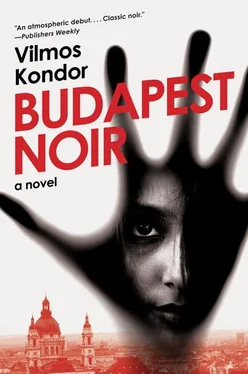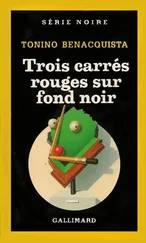“Are you threatening me?” asked Gordon, raising his eyebrows. “Like you did with Krisztina? That chicken with the broken neck was a pretty cheap trick, after all. There was no need for that. It just speaks of bad taste.”
“But it was enough to get you to take that little gal of yours by the hand,” Szőllősy declared, “and run out of town with your tail between your legs.”
“Of course,” said Gordon. “And for a few other reasons. For example, to speak with Teréz Ökrös. I was able to type this up”—Gordon pointed to his stenciled notes—“and have them sent to our correspondents in Vienna, Berlin, Prague, and London. They also work for local papers there, you know. You can have me kicked out of my job and you can have my article pulled. Go right ahead; don’t let me stop you. But if you don’t do as I say, things will start happening. The foreign papers will publish my article, which the Evening or Hungary can then feel free to run. Doing so won’t spell trouble for anyone. Except you.”
Szőllősy sat back down in his chair and stared at the cigar butt.
“Now you pay attention to me,” Gordon continued, then reached into his pocket, pulling out a folded sheet of paper and throwing it on the desk in front of Szőllősy. “That’s the address of a maternity home. Tomorrow you will wire them one hundred thousand pengős. And on November 1, another hundred thousand. The same sum on the first of every month. Until your assets are depleted. Don’t tell me I’m not giving you enough time to sell the business. One hundred thousand pengős a month. As long as you still have money left.”
“What the hell are you talking about?!” Szőllősy shouted, his face beet-red.
“As long as you’ve robbed your daughter of the chance to give birth to her child—your grandchild—then the least you can do is help others.”
“What?!” exclaimed the woman, cupping a hand to her mouth.
Gordon reached into the inner pocket of his blazer, pulled out the second page of the autopsy report, and dropped it on the table. “This goes with the summary. The coroner’s detailed report.”
Szőllősy cast Gordon a petrified stare while his wife gasped for breath.
“Tomorrow morning I’ll be calling the maternity home. Wire the money. Or have it taken over in a briefcase. I don’t care.” With that, he buttoned up his blazer and left them to their own devices.
In the vestibule Gordon removed his jacket from the coatrack and pressed his hat on his head. He heard the rattling of pots and pans from the kitchen. The maid was washing dishes.
“Kid,” he called over. “Be prepared to look for a new job soon.”
The girl lowered a pot into the water and looked at Gordon. “I know,” she said quietly. “I know.”
He boarded a tram and looked out at the gray, sleet-laden city. At the Oktogon he bought some roast chestnuts from a vendor, then headed toward the Circle.
Parked out front was Czövek’s banged-up old Opel. The cabbie was sitting behind the wheel, smoking. On seeing Gordon approach, he sprang out of the car.
“Good evening, Mr. Editor!”
“Good evening, Czövek. Did you and Krisztina get back okay?”
“Yes, sir.”
“Fine, then,” said Gordon with a nod, and he headed toward the door.
“Mr. Editor!” Czövek called after him.
“Yes?”
“Your change is five pengős, sir.”
“Five pengős?”
“That’s right, sir. You gave me fifty, and the trip cost only forty-five.”
“And how did you figure that?”
“It wasn’t easy,” replied the cabbie with a grin.
“Well, if I’m still due five pengős, then we’ll take another ride. If you wait around a bit, then this evening you’ll still have a little something to do.”
Mór was sitting at the kitchen table, a bowl of chestnuts in front of him; Krisztina was nowhere to be seen.
“Don’t bother looking for her, son,” said the old man. “She came upstairs, said hi, then left. Convincing her to stay would have been impossible. Not that I wanted to.”
“Did she tell you I left without her?” asked Gordon as he took a seat beside his grandfather.
“She did. It wasn’t nice of you.”
“I know, Opa. Maybe I overreacted a bit. But now I’ve taken care of things.”
“You don’t say,” said Mór, raising his eyes.
“At least part of it.”
The old man rummaged through the bowl of chestnuts. “What are you planning, son?”
“Nothing special, Opa.”
The old man was silent for a while. Finally, he said, “You remember what your father said about revenge?”
Gordon sighed.
“He never did take revenge on anyone,” Mór continued. “He always said he just stood there holding this pipe that eventually everyone would run up through, leaving him with nothing else to do than to hold both ends shut.”
“I’m not so sure I want to talk about this, at least not now and not here.”
“I know that.”
“Opa,” snapped Gordon, “just look how far my father got with that famous pipe of his. He just stood there with that rotten pipe in his hands, waiting and waiting and waiting, and when he couldn’t hold it any longer . . .”
“What could he have done? The world crisis wasn’t the work of one person. He didn’t know who to blame, and so he blamed himself.”
“I know, Opa. I was there with him when he flung away the pipe and everything else, for that matter.”
Mór looked out the window and scanned the Circle below. The light of the streetlamps traced the contours of his stout frame, his bushy beard, his sunken shoulders.
“I’ve got to go, Opa. I’ve got to go get Krisztina.”
“You know where she is?”
“I suspect,” replied Gordon.
“Normafa,” said Gordon as he took a seat in the Opel. Czövek started up the engine and made his way down Andrássy Street to the Oktogon, and from there along the Grand Boulevard, across the Margaret Bridge to Buda, and via King Matthias Road up toward the romantic hilltop setting that was Normafa. The traffic was sparse and the pedestrians were few as they drove along the narrow wooded road through the Buda hills. The only signs of life were the lights behind the windows of the villas they passed.
Gordon had Czövek stop by the old water tower. He got out and called back, “Wait here. I won’t be long.”
At the edge of the dark forest surrounding the water tower, there was a tavern, a little lamp burning above its door. The cold wind stung. Gordon turned up his collar. On reaching the tavern, he spotted Krisztina. She was sitting outside on a bench toward the other end of the little building, a porcelain mug beside her, presumably filled with hot spiced wine she’d bought inside. She gazed upon the city that stretched out far below, occasionally lifting the mug to her lips. On hearing Gordon approach, she turned around but quickly looked away.
“If I tell you not to say a word to me, you won’t be able to resist, will you?” she asked, staring out at the city.
“Just in the interest of preserving the order of things,” Gordon replied. “But why exactly are you still angry with me?”
Krisztina was silent.
“Because I wanted to protect you?” asked Gordon. “Because I didn’t want you to maybe wind up in the same trouble I was in?”
“Sometimes I just really hate you,” said Krisztina. “The problem isn’t that you left me behind, Zsigmond. That’s the least of it. You didn’t tell me what you were planning.”
“I would have told you if you hadn’t fallen asleep on account of the wine and the brandy.”
“I expected you to cook up a better lie than that.”
“That’s not a lie.”
Читать дальше
Конец ознакомительного отрывка
Купить книгу












